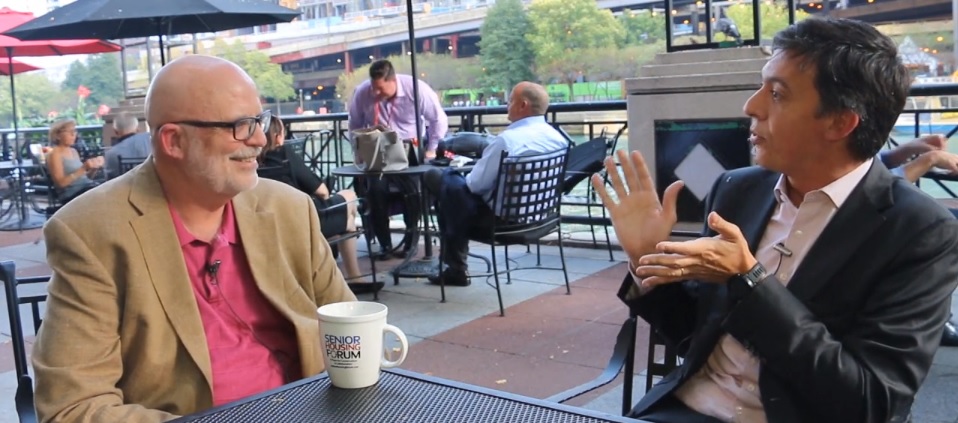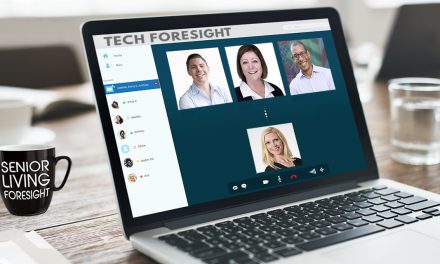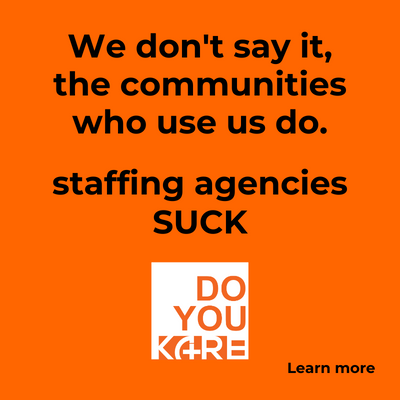Steve Moran sat down with Ricardo Soares from Brazil Senior Living, an innovative new company with 10 buildings—and likely many more to come—across Brazil.
By Michelle Seitzer
At the recently held 2017 NIC (National Investment Center for Seniors Housing & Care) Fall Conference in Chicago, Steve Moran sat down with Ricardo Soares from Brazil Senior Living (BSL), an innovative new company with 10 buildings—and likely many more to come—across Brazil.
With 1,500 senior living units and 0 competitors, Soares is in quite the position right now: Brazil Senior Living is the first company of its kind in the country.
Their first community opened in August 2015 and had 95% occupancy within 13 months. And since this initial launch was so successful, they decided to go for the other buildings, Soares told Moran. Other buildings have done equally well—if not better: two of them are at 100% capacity, another at 95, and two others at 65 and 70. A few of the more recently opened communities have a fairly low occupancy rate at the moment (not surprising, given the speed of their launch campaign), but Soares is confident those buildings will soon be full.
Changing Minds in a Changing Market
Soares is cautiously optimistic about such rapid growth though. “We want to make sure we’re receiving and accommodating the demand in a safe way,” he says. And communicating that message to families is a big piece of their current and future success.
Why? Because most of the news in Brazil around senior living thus far is gloom and doom, i.e. “elderly man dies when senior living home burns to the ground,” says Soares. Presenting a positive view of senior living—and its benefits to both families and the individual who makes the move—will be key to changing Brazilians’ minds about this market.
“The Same Business Everywhere”
Moran asked Soares if he had been in contact with any American senior living providers as he launched his own company. Other than a brief consulting project on site in Brazil with Watercrest Senior Living, Soares reports being a regular attendee at NIC events—and admits to doing some opportunistic networking there.
“Sometimes I just stay outside of the rooms waiting for the big guys to come out,” he says. “Then I jump at them so I can talk to them, and ask if I can visit their facility . . . go behind the scenes to learn how the food is prepared . . . how laundry is done . . . how physicians talk to the nurses,” he says.
Soares also traveled to Europe to talk to, and learn from, providers in France and Spain. And while there were some details that changed from country to country, Soares said this: “It’s the same business everywhere.”
What Sets Brazil Senior Living Apart
While the senior living model is a fairly universal one, Moran and Soares discussed some of the biggest differences in Brazil: financing, messaging, advertising, and more.
One of the major challenges? “We’re about 30 to 40 years behind you guys,” says Soares. That means evolving as a country, Soares believes, but also, in overcoming the challenges of talking about senior care. People aren’t used to talking about it, he adds.
When it comes to marketing, Brazil Senior Living has an impressive 200K visitors come to their website each month—which is great, as it’s their primary means of advertising, other than local magazines.
One of their major opportunities? Due to extremely high-interest rates in Brazil, BSL currently does all their financing through private equity firms—which is probably why they have no competition, Soares suggests.
Looking Ahead: Partnerships, Regulations, and More
Soares would actually love to partner with American senior living providers as they continue to “convince the market” of the need for their services. The age wave we’ve experienced in the US in the past decade is coming to Brazil, and with 200 million residents, Soares believes the impact will be felt in the next decade there. Moran and Soares also discussed staffing and training challenges and opportunities, and the regulatory environment in Brazil, particularly how it could create social problems.
Soares welcomes visitors from the US who would like to do operational benchmarking, joint ventures or discuss other possibilities for partnership. “Our doors are open, and we’re very flexible,” he says.








